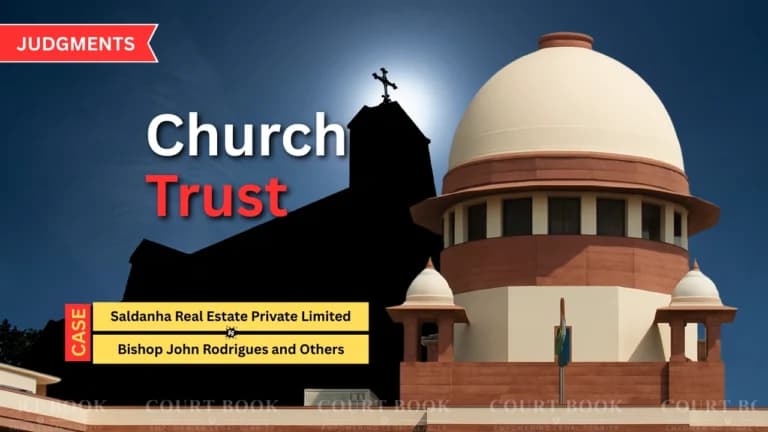The Supreme Court of India has dismissed appeals filed by Saldanha Real Estate Pvt. Ltd., Shri Kadeshwari CHS Ltd. (Proposed), and the Slum Rehabilitation Authority (SRA), thereby upholding the Bombay High Court’s decision that favored the Basilica of Our Lady of the Mount (Church Trust) in a land redevelopment dispute.
Background of the Case
The dispute concerned a 1,596.40 sq. m. plot at CTS No. B-960 in Bandra, Mumbai, owned by the Church Trust. This land, partly declared a slum in 1978, had been occupied by slum dwellers for decades. In 2017, Kadeshwari Society entered into a development agreement with Saldanha Real Estate to redevelop the slum area. However, the Church Trust opposed independent redevelopment, insisting on a composite plan covering its larger property, including "Nirmala Colony."
Read also: Kolkata Lawyers Stage Court Boycott Following Brutal Police Attack on Advocate
Despite objections, the SRA declared the land a Slum Rehabilitation Area (SR Area) in December 2020 and later initiated acquisition proceedings in favor of Saldanha. The Church Trust challenged this before the Bombay High Court, which struck down the acquisition as illegal and recognized the Trust’s preferential right to redevelop.
A Bench of Justices Surya Kant and Ujjal Bhuyan analyzed the 2018 amendments to the Maharashtra Slum Areas (Improvement, Clearance, and Redevelopment) Act, 1971. The Court clarified that even after the amendments, landowners retain a preferential right to redevelop their property.
“The private owner of a Slum Rehabilitation Area has a preferential right to develop it. The SRA must invite the landowner before acquisition, and such right can only be extinguished if not exercised within 120 days,” the Court held.
Read also: Supreme Court Sends Odisha Election Dispute Back to High Court for Fresh Review on Affidavit Defects
The Court found that no such notice was ever issued to the Church Trust under Section 13 of the Act. Hence, its right to redevelop remained intact.
The Court strongly criticized the actions of Kadeshwari Society, Saldanha, and the SRA:
- Kadeshwari Society & Saldanha: The Court noted that the Society ignored better offers from the Trust and instead favored Saldanha, which sought to exploit the land at a low acquisition cost. It observed that Saldanha was “orchestrating the Society’s actions from behind the scenes.”
- SRA: The Authority was found guilty of bias and collusion, having rejected the Trust’s redevelopment proposal on “hyper-technical grounds” while favoring Saldanha’s.
Read also: Delhi High Court Rules Differently in DSSSB Roll Number Bubbling Dispute
The Supreme Court dismissed all appeals and upheld the High Court’s ruling. It directed:
- The Church Trust may submit its Slum Rehabilitation Scheme within 120 days.
- The Trust must honor its promises to slum dwellers regarding apartment size and facilities.
- The SRA and State Government must assist the Trust and process its proposal within 60 days of submission.
“Such actions of a public authority, marred by collusion and motivated by extraneous profit interests of private builders, are highly depreciable,” the Court remarked, condemning the misuse of law for private gain.
Case Name: Saldanha Real Estate Private Limited vs Bishop John Rodrigues and Others
Along with Related Appeals: Shri Kadeshwari CHS Ltd (Proposed) vs Bishop John Rodrigues and Others, and Slum Rehabilitation Authority vs Bishop John Rodrigues and Others)
Case Type: Civil Appeals (arising out of Special Leave Petitions)
Decision Date: 22 August 2025















